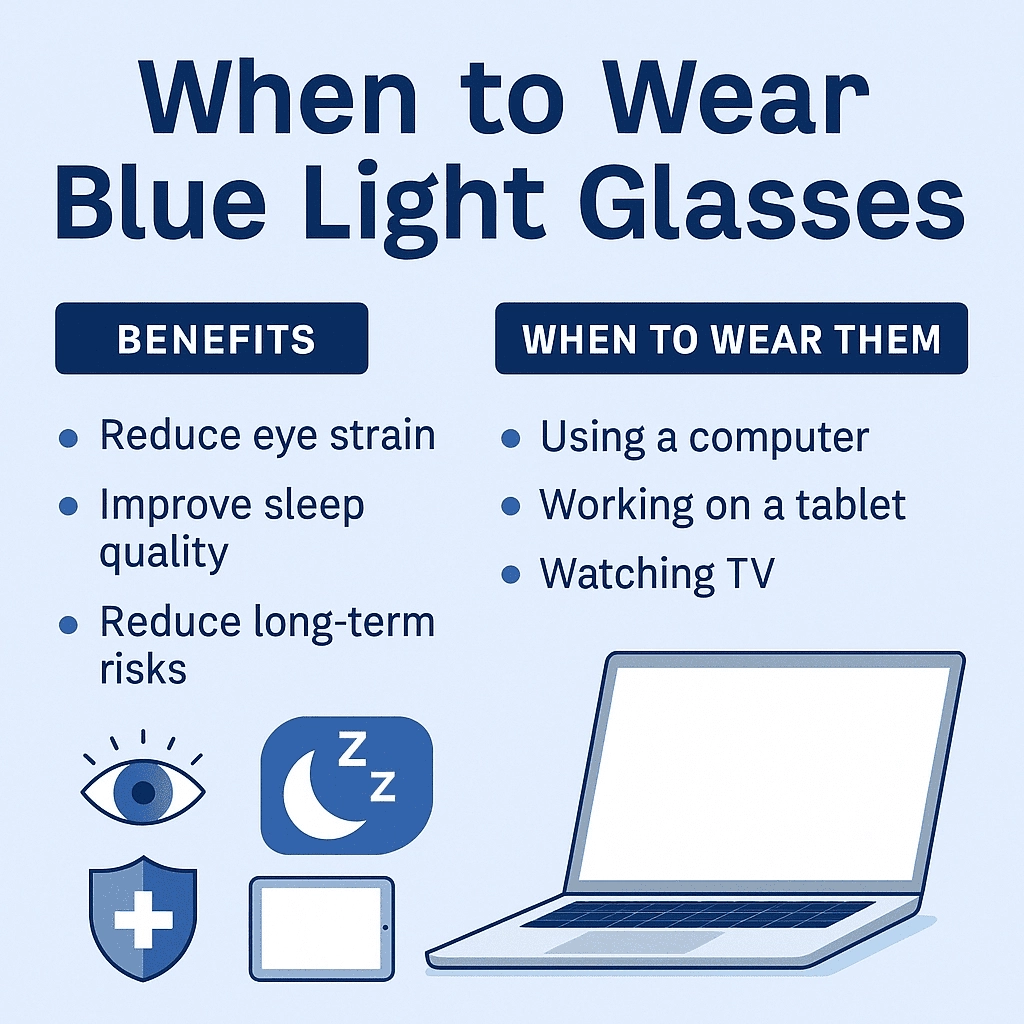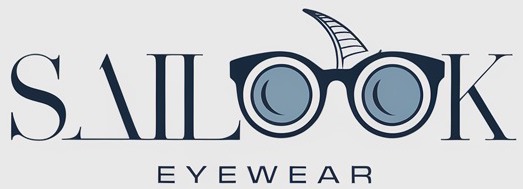Blue light glasses have become a popular accessory for individuals spending long hours in front of digital screens. The importance of protecting your eyes from blue light exposure is undeniable, yet many people are unsure about when and how to wear these glasses. In this article, we will explore the best practices for wearing blue light glasses, the benefits, and the times when they are not necessary. Whether you’re a digital marketer, a content creator, or simply someone looking to protect their vision, this article will provide comprehensive insights into blue light protection.

1. Why Should You Wear Blue Light Glasses?
What’s the real story? Blue light, which is emitted from screens, has been shown to cause eye strain, fatigue, and even sleep disruption. When we spend long hours on our phones, laptops, or any digital device, the constant exposure can take a toll on our eyes and overall health. Blue light glasses are specifically designed to filter out harmful blue wavelengths, minimizing the adverse effects.
Many individuals experience symptoms like headaches, blurry vision, and dry eyes after prolonged screen time. These are common signs of digital eye strain, also known as computer vision syndrome (CVS). The increasing dependence on screens for work, education, and entertainment makes it essential to find a solution to these issues.
Ready for the good part? Blue light glasses can reduce these symptoms significantly, providing relief by blocking the harmful blue light emitted by screens. Furthermore, these glasses help reduce glare, improving visual clarity. By wearing blue light glasses, you are protecting your eyes from potential long-term damage and enhancing your overall comfort during screen use.
| Symptoms of Digital Eye Strain | How Blue Light Glasses Help |
|---|---|
| Eye fatigue | Reduces glare from screens |
| Headaches | Minimizes blue light exposure |
| Blurred vision | Enhances visual comfort |
| Dry eyes | Prevents eye irritation |
2. When Should You Wear Blue Light Glasses?
This is where it gets interesting… The best time to wear blue light glasses is when you’re exposed to digital screens for extended periods. If you’re working for hours on end, engaging in long video calls, or playing video games, blue light glasses are your best ally in protecting your eyes.
There are other situations where wearing blue light glasses can help too. For instance, when you are reading an eBook on your tablet or checking your social media on your phone, blue light glasses can reduce the risk of eye strain. Since modern devices emit blue light continuously, wearing these glasses during your entire screen time can keep your eyes safe.
But here’s the kicker… It’s essential to wear these glasses not just for work-related tasks but also for leisure activities such as watching TV or browsing the internet at home. Blue light glasses protect you from the cumulative exposure to artificial light.
| Activity | Reason to Wear Blue Light Glasses |
|---|---|
| Working on a computer | Extended exposure to screens |
| Watching TV | Blue light from screens |
| Reading eBooks | Continuous screen use |
| Gaming | Prolonged screen time |
| Social media browsing | Constant screen engagement |
3. Can Blue Light Glasses Help with Sleep Issues?
What’s the real story? One of the most significant concerns related to blue light exposure is its impact on your sleep. Blue light suppresses melatonin production, which is the hormone that regulates your sleep cycle. This disruption can make falling asleep more difficult and affect the quality of your sleep.
What’s the catch? Wearing blue light glasses, especially in the evening, can help prevent this interference. By blocking blue light exposure from screens, you allow your body to maintain its natural circadian rhythm, which is essential for good sleep quality.
Here’s the kicker… A recent study showed that individuals who wore blue light glasses in the evening reported improved sleep quality. This is particularly important for those who work late or engage in activities like watching TV before bed. If you’re someone who struggles with falling asleep after late-night screen time, wearing blue light glasses can be the solution.
| Time of Day | Effect of Blue Light on Sleep |
|---|---|
| Morning | Minimal impact on circadian rhythm |
| Afternoon | Moderate exposure can affect sleep later |
| Evening | Significant disruption of melatonin production |
4. How Do Blue Light Glasses Protect Your Eyes?
What’s the real story? Blue light glasses are designed to block or filter out the high-energy visible (HEV) blue light that digital screens emit. This light has a shorter wavelength, which means it carries more energy and can penetrate deeper into the eye.
Ready for the good part? By reducing this exposure, blue light glasses help alleviate eye strain, prevent headaches, and minimize long-term damage to the retina. Some studies have also suggested that blue light glasses can reduce the risk of macular degeneration, a condition that leads to loss of vision over time.
But here’s the kicker… Not all blue light glasses are created equal. Some glasses are specifically designed to block out more blue light, while others offer minimal protection. It’s essential to choose glasses with a high blue light blocking percentage for the best results.
| Type of Lens | Blue Light Blocking Effectiveness |
|---|---|
| High-performance lenses | Block up to 90% of blue light |
| Standard lenses | Block up to 40% of blue light |
| Fashion lenses | Block minimal blue light |
5. Are There Any Benefits to Wearing Blue Light Glasses During the Day?
What’s the real story? You might think that blue light glasses are only useful at night, but they offer significant benefits during the day too. By reducing glare from digital screens, blue light glasses enhance visual clarity, reduce fatigue, and improve comfort. This is especially helpful for individuals who work in front of screens for long periods.
This is where it gets interesting… During the daytime, natural light is present, and while it’s less intense than artificial light, it still contributes to eye strain when combined with the brightness of digital screens. Blue light glasses reduce this strain, allowing you to work longer without discomfort.
But here’s the kicker… Wearing blue light glasses during the day can also improve focus and concentration, especially in work environments that involve prolonged computer usage.
| Time of Day | Benefit of Blue Light Glasses |
|---|---|
| Morning | Prevents eye strain from digital screens |
| Afternoon | Reduces glare and discomfort |
| Evening | Protects sleep cycle from blue light exposure |
6. When NOT to Wear Blue Light Glasses?
What’s the real story? While blue light glasses are beneficial for many screen-related activities, there are times when wearing them may not be necessary. For instance, if you’re outdoors in natural light, blue light glasses won’t offer any added protection. The sun provides natural blue light that your eyes are accustomed to.
Ready for the good part? When you’re engaging in physical activities like exercising, blue light glasses should be avoided. They are designed for screen-based tasks, not for activities requiring physical movement or intense focus.
But here’s the kicker… If you’re experiencing any discomfort or strain while wearing blue light glasses, it may be time to take a break and adjust their fit. Wearing them unnecessarily for activities they aren’t designed for can cause more harm than good.
| Activity | Reason to Skip Blue Light Glasses |
|---|---|
| Outdoor activities | Natural sunlight provides blue light |
| Exercise or sports | Glasses are not needed for physical activity |
| Bright environments | Blue light glasses are not necessary |
7. What to Consider When Choosing Blue Light Glasses?
What’s the real story? Not all blue light glasses are created equal. When choosing a pair, you need to consider factors like lens material, the level of blue light filtering, comfort, and aesthetics. A well-made pair of glasses will provide optimal protection and ensure long-lasting comfort.
This is where it gets interesting… Some lenses offer additional features like anti-reflective coatings or UV protection, which can further enhance your visual comfort. The style of the glasses is also important, especially if you plan to wear them in professional or social settings.
Ready for the good part? It’s also crucial to consider the fit of the glasses. Poorly fitting glasses can cause discomfort, leading you to avoid wearing them altogether.
| Feature | Benefit |
|---|---|
| High filtering lenses | Protects eyes from most blue light |
| Anti-reflective coating | Reduces glare for better clarity |
| Comfortable fit | Ensures long-lasting comfort |
8. How Do Blue Light Glasses Compare to Regular Eyewear?
What’s the real story? Blue light glasses are different from regular eyewear in that their primary purpose is to block or filter out blue light. While prescription glasses are meant to correct vision, blue light glasses are designed to protect your eyes from the harmful effects of prolonged screen exposure.
But here’s the kicker… Many people opt to combine both types of eyewear, using prescription lenses with a blue light filter. This offers the best of both worlds—vision correction and eye protection.
What’s the catch? If you don’t need prescription lenses, you can still benefit from non-prescription blue light glasses, which provide the same protective features without affecting your vision.
| Eyewear Type | Purpose |
|---|---|
| Blue light glasses | Block harmful blue light |
| Prescription glasses | Correct vision |
| Combined eyewear | Vision correction + blue light protection |
9. Can Blue Light Glasses Cause Any Side Effects?
What’s the real story? Blue light glasses are generally safe, but there can be occasional side effects. Some individuals report feeling discomfort or experiencing distorted color perception when wearing certain types of blue light lenses.
Ready for the good part? If you experience discomfort, it’s important to check the fit and adjust the lens tint. In rare cases, the lens might be too dark or have a color shift, leading to confusion while reading or working.
But here’s the kicker… It’s always a good idea to consult an optometrist if you experience ongoing issues to ensure the glasses are suited to your needs.
| Possible Side Effect | Solution |
|---|---|
| Discomfort | Adjust the fit or lens type |
| Color distortion | Choose a different lens tint |
| Headaches | Consult an optometrist for proper fitting |
10. Do Blue Light Glasses Work for Everyone?
What’s the real story? While blue light glasses are effective for many, they might not work for everyone. People with certain eye conditions or sensitivities may experience minimal benefits.
What’s the catch? Individuals who already suffer from serious vision problems or dry eye syndrome may find that blue light glasses offer only slight relief.
Ready for the good part? If you’re unsure whether blue light glasses will work for you, it’s a good idea to try them out and see how your eyes feel after using them for a few days.
| Condition | Effectiveness of Blue Light Glasses |
|---|---|
| General eye strain | Effective relief |
| Severe dry eye | Minimal benefit |
| Visual impairment | Consult an optometrist |
11. How Long Should You Wear Blue Light Glasses Each Day?
What’s the real story? The recommended amount of time to wear blue light glasses depends on your screen time. If you spend several hours per day on digital devices, it’s ideal to wear them throughout your screen use.
But here’s the kicker… It’s important to take regular breaks, even when wearing blue light glasses, to give your eyes a rest. Following the 20-20-20 rule—every 20 minutes, look at something 20 feet away for 20 seconds—is a great practice.
| Screen Time | Recommended Usage |
|---|---|
| 1–3 hours | Wear glasses for the entire duration |
| 3–5 hours | Use glasses and take breaks every 20 minutes |
| 5+ hours | Ensure glasses fit well and protect your eyes regularly |
12. Can You Wear Blue Light Glasses While Watching TV?
What’s the real story? Many people wonder whether blue light glasses are necessary for watching TV. Since most modern televisions emit blue light, the glasses can help reduce strain, especially during long viewing sessions.
Ready for the good part? While it’s not absolutely essential to wear blue light glasses while watching TV, they can certainly enhance comfort, particularly if you’re watching in a dark room or using a large screen.
| Activity | Benefit of Blue Light Glasses |
|---|---|
| Watching TV | Reduces strain from blue light exposure |
| Gaming | Protects against prolonged screen use |
| Browsing | Enhances visual comfort |
13. How Much Do Blue Light Glasses Cost?
What’s the real story? The cost of blue light glasses varies depending on the brand, quality of the lenses, and additional features. On average, you can expect to pay anywhere from $20 to $200.
This is where it gets interesting… Higher-priced options often come with better features, such as higher blue light blocking percentages, anti-glare coatings, and stylish frames.
Ready for the good part? It’s essential to balance your budget with your needs. Opt for glasses that fit your lifestyle and offer the best protection for your eyes without breaking the bank.
| Price Range | Key Features |
|---|---|
| $20–$50 | Basic blue light protection |
| $50–$100 | Anti-glare coating, stylish frames |
| $100+ | Premium lenses, UV protection, high-quality materials |
14. What Are Some Popular Brands for Blue Light Glasses?
What’s the real story? There are many brands that specialize in blue light blocking eyewear. Popular options include Felix Gray, Warby Parker, and Quay Australia, which are known for their stylish designs and effective protection.
But here’s the kicker… When choosing a brand, consider factors like lens effectiveness, comfort, and customer service. Some brands offer virtual try-ons or customer satisfaction guarantees, which can help make your decision easier.
| Brand | Special Feature |
|---|---|
| Felix Gray | Stylish, high-performance lenses |
| Warby Parker | Affordable, stylish frames |
| Quay Australia | Trendy designs and blue light protection |
15. Conclusion
Blue light glasses are an excellent solution for anyone looking to protect their eyes from the harmful effects of prolonged screen time. They offer numerous benefits, including reducing eye strain, preventing headaches, and improving sleep quality. However, it’s essential to know when and how to wear them to get the maximum benefits. If you haven’t already tried blue light glasses, now might be the perfect time to invest in them. Don’t let screen time take a toll on your eyes—protect your vision and enjoy digital devices with comfort.
FAQ Section
Q1: What are blue light glasses?
Blue light glasses are designed to block or filter out blue light emitted from digital screens, protecting your eyes from strain and discomfort.
Q2: How do blue light glasses work?
They use special lenses that filter blue light, reducing glare and minimizing eye strain from prolonged screen exposure.
Q3: Can I wear blue light glasses all day?
Yes, they are safe to wear throughout the day, especially if you’re exposed to digital screens for extended periods.
Q4: Are blue light glasses effective for improving sleep?
Yes, wearing blue light glasses in the evening can help prevent sleep disruptions caused by blue light exposure from screens.
Q5: Do blue light glasses work for everyone?
Blue light glasses are effective for most people, but results may vary depending on individual sensitivities and conditions.

